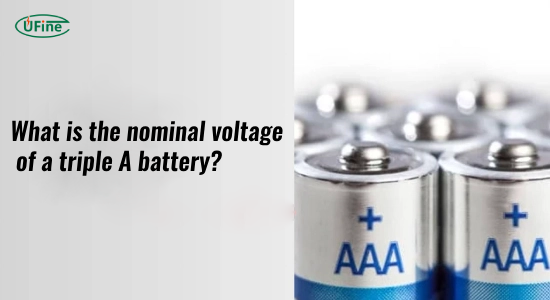Understanding the voltage of AAA batteries is essential for anyone who relies on these small yet powerful energy sources for their devices. Whether you’re powering a remote control, a digital camera, or a small toy, knowing the specifics about AAA battery voltage can help you make informed choices about which batteries to use and how to maintain them. This comprehensive guide will explore everything you need about AAA battery voltage, including types, applications, and frequently asked questions.
Part 1. What is the nominal voltage of a triple A battery?
The nominal voltage of a standard AAA battery is 1.5 volts. Alkaline and lithium batteries typically provide this voltage. However, if you opt for rechargeable versions like nickel-metal hydride (NiMH) batteries, you will find that they usually deliver around 1.2 volts. Understanding these differences is crucial because it affects how well your devices perform based on their voltage requirements.
Key Voltage Characteristics
- Alkaline AAA Batteries: 1.5 volts
- Lithium AAA Batteries: 1.5 volts
- Rechargeable NiMH AAA Batteries: 1.2 volts
Knowing the nominal voltage helps ensure you select the right battery type for your device, preventing potential damage or malfunction due to incorrect voltage levels.
AAA Rechargeable Batteries: Your Essential Guide
Part 2. How does battery chemistry affect voltage?
The chemistry behind AAA batteries plays a significant role in determining their voltage output. Different chemical compositions yield varying voltages and capacities:
| Battery Type | Nominal Voltage | Rechargeable |
|---|---|---|
| Alkaline | 1.5 V | No |
| Lithium | 1.5 V | No |
| NiMH | 1.2 V | Yes |
| NiCd | 1.2 V | Yes |
Impact of Chemistry on Performance
- Alkaline Batteries: These are the most common type of AAA batteries used in everyday devices. They have a stable output of 1.5 volts and are non-rechargeable.
- Lithium Batteries: Known for their longevity and consistent performance, lithium AAA batteries also provide 1.5 volts and can handle higher-drain applications better than alkaline types.
- NiMH Batteries: While these rechargeable batteries offer lower nominal voltage (1.2 volts), users can recharge them multiple times, making them more cost-effective in the long run.
Understanding these characteristics allows users to choose the right type of battery based on their specific needs.
Part 3. How many volts do three triple A batteries produce?
Three AAA batteries collectively produce approximately 4.5 volts (1.5 V + 1.5 V + 1.5 V) when connected in series. This configuration is commonly used by devices requiring higher voltages than a single battery.
Total Voltage Calculation
- Total Voltage=Number of Batteries×Voltage per Battery
For three AAA batteries:
- Total Voltage=3×1.5V=4.5V
This principle applies to any number of batteries connected in series, making it essential for powering devices that require higher voltages.
Part 4. How to check the voltage of a triple A battery?
Checking the voltage of an AAA battery is straightforward and can be done using a voltmeter or multimeter:
Steps to Measure Voltage
- Gather Your Tools: Obtain a digital multimeter or voltmeter.
- Set Up the Voltmeter: Turn on your device and set it to measure DC voltage.
- Connect Probes: Place the red probe on the positive terminal and the black probe on the battery’s negative terminal.
- Read the Display: The multimeter will display the battery’s current voltage.
This simple process helps determine whether your batteries are still functional or need replacing.
Part 5. What factors affect AAA battery voltage?
Several factors can influence the actual output voltage of AAA batteries during use:
- Discharge Rate: As batteries discharge, their voltage can drop below nominal levels, especially under heavy loads.
- Temperature: Extreme temperatures can affect chemical reactions within the battery, leading to lower voltages.
- Battery Age: Older batteries may hold their charge less effectively, resulting in reduced output.
Understanding these factors can help you optimize battery usage and prolong their lifespan.
Part 6. Common applications for triple A batteries
Due to their compact size and adequate power output, many devices widely use AAA batteries.
- Remote Controls: Most TV remotes use two or more AAA batteries.
- Digital Cameras: Many cameras rely on AAA batteries for portability.
- Toys and Gadgets: Small electronic toys often require AAA batteries for operation.
These applications highlight why understanding AAA battery specifications is crucial for ensuring device compatibility and performance.
Part 7. What happens if I mix different types of triple A batteries?
Mixing different types of AAA batteries—such as alkaline with rechargeable NiMH—can lead to several issues:
- Voltage Mismatch: Different voltages can cause devices to malfunction or operate inefficiently.
- Reduced Performance: The overall performance may decline if one type discharges faster than another.
- Potential Damage: In some cases, mixing battery types can lead to overheating or leakage, damaging both the device and the batteries.
To avoid these problems, always use identical types and brands of batteries in your devices.
Part 8. How long do triple A batteries last?
The lifespan of AAA batteries varies based on several factors:
- Type of Battery: Alkaline batteries generally last longer than rechargeable ones when used in low-drain devices.
- Usage Patterns: Frequent use in high-drain devices will deplete them faster than occasional use in low-drain applications.
- Storage Conditions: Proper storage in excellent, dry places extends battery life significantly.
Typically, alkaline AAA batteries can last several months to years, depending on usage conditions, while rechargeable NiMH versions may last between one to three years with proper care.
Part 9. Can I recharge triple A alkaline batteries?
While some alkaline AAA batteries are marketed as “rechargeable,” it is generally not recommended to recharge standard alkaline batteries due to safety concerns:
- Risk of Leakage or Explosion: Recharging non-rechargeable alkaline batteries can cause them to leak or even explode under certain conditions.
- Reduced Performance: Even if they appear functional after recharging, their capacity diminishes significantly over time.
For safety and efficiency, it’s best to use dedicated rechargeable NiMH or lithium-ion AAA batteries if you need rechargeability.
Part 10. FAQs
-
How many volts are in a standard triple A battery?
A standard alkaline or lithium triple A battery has a nominal voltage of 1.5 volts, while rechargeable NiMH versions typically provide around 1.2 volts. -
Can I use rechargeable triple A batteries instead of regular ones?
Yes, but before substituting standard alkaline batteries for rechargeable NiMH batteries, ensure that your device is compatible with their lower voltages (1.2V). -
What should I do if my device doesn’t work with new triple A batteries?
Check if you’ve mixed different types or brands of batteries; also, ensure they are installed correctly with proper polarity. -
How do I store my triple A batteries properly?
Store them in a cool, dry place away from direct sunlight and extreme temperatures. Avoid mixing old and new batteries when storing. -
Are there any environmental considerations when disposing of triple A batteries?
Yes! Always recycle used batteries at designated recycling centers to prevent environmental contamination from hazardous materials found in some types of batteries.
Related Tags:
More Articles

How to Choose the Best Floor Scrubber Battery for Commercial Cleaning?
Selecting the ideal floor scrubber battery ensures a long runtime, rapid charging, and minimal maintenance for efficient commercial cleaning operations.
Battery for Blower vs Battery for Leaf Vacuum: Which One Should You Choose?
Battery for blower vs leaf vacuum—learn the key differences in power, fit, and runtime to choose the right battery for your outdoor tool needs.
How to Choose the Right Battery for Blower?
Choosing the right blower battery? Consider voltage, capacity, chemistry & usage. This guide helps match the best battery for peak performance.
How to Choose the Best Insulated Battery Box for Lithium Batteries?
Choosing the Best Insulated Battery Box for Lithium Batteries? Discover key factors such as size, material, and safety for optimal protection and performance.
7 Critical Elements on a Lithium Battery Shipping Label
What must be on a lithium battery shipping label? Learn 7 key elements to ensure safety, legal compliance, and correct handling across all transport modes.





